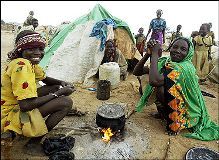A new Sudan action plan – ICG
NAIROBI/BRUSSELS, April 26, 2005 (IGC) — Despite recent UN Security Council resolutions and a peace agreement covering the south, parts of Sudan remain at war or threatened by war and the security situation in Darfur is deteriorating. Stronger measures are needed to restore security and prevent further mass deaths.
 A New Sudan Action Plan,* the latest briefing by the International Crisis Group, outlines a policy blueprint for the next steps required in Darfur, where as many as 10,000 civilians or more die each month, and elsewhere in the giant country.
A New Sudan Action Plan,* the latest briefing by the International Crisis Group, outlines a policy blueprint for the next steps required in Darfur, where as many as 10,000 civilians or more die each month, and elsewhere in the giant country.
“The UN, NATO and the EU need to get together urgently with the African Union (AU), decide who can do what best in Darfur and then do it without regard for institutional prerogatives or national prestige”, says Suliman Baldo, Crisis Group’s Africa Program Director. “How to maximise cooperation between these four organisations — how to get the necessary additional troops on the ground quickly enough with equipment, structure and command organisation to be effective — is probably the single most urgent and complex issue the international community faces with the entire Sudan portfolio”.
The UN Security Council resolutions at the end of March 2005 were welcome, if long overdue, steps, raising the prospect that senior Khartoum officials will finally be held criminally accountable for their Darfur policy. But the situation remains very grave, and more action is needed to:
1. protect civilians and relief agencies in Darfur by reinforcing AU peacekeepers with a stronger mandate and more troops — up to at least 10,000 total — that are properly resourced; enforcing the arms embargo and military flight ban over Darfur; neutralising government-controlled militias and enabling IDPs and refugees to return home;
2. implement accountability by getting the proposed Sanctions Committee operational; by widening targeted sanctions; and aiding the International Criminal Court investigation;
3. build a Darfur peace process by devising a blueprint for negotiations and appointing a lead senior mediator from the AU as well as U.S., EU, and UN envoys to lend support;
4. implement the existing peace agreement for southern Sudan by deploying the proposed UN mission rapidly; effectively managing the oil sector; pressing for security sector reform; and ending the capacity of Khartoum hardliners to use the Ugandan insurgency, the Lord’s Resistance Army, to sabotage stability in southern Sudan; and
5. prevent new conflict in the east, before it becomes the next major civil war.
“In the absence of more assertive action, a resumption of war threatens the south, fighting could intensify in the east, and mortality rates will skyrocket in Darfur, where localised famine threatens”, says John Prendergast, Special Advisor to the President of Crisis Group. “The future of the Sudanese state and its people are at stake, and their fate will be determined by the actions the international community now takes — or fails to take — to counter atrocity crimes and promote peace throughout the country”.
The full report is available at http://www.crisisgroup.org/home/index.cfm?l=1&id=3391
